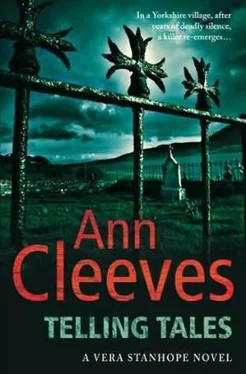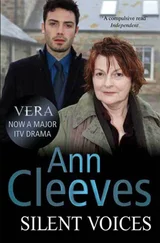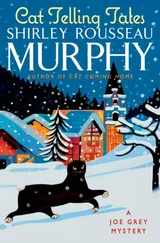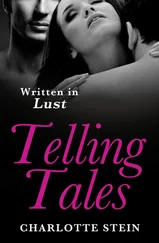Ann Cleeves - Telling Tales
Здесь есть возможность читать онлайн «Ann Cleeves - Telling Tales» весь текст электронной книги совершенно бесплатно (целиком полную версию без сокращений). В некоторых случаях можно слушать аудио, скачать через торрент в формате fb2 и присутствует краткое содержание. Жанр: Детектив, на английском языке. Описание произведения, (предисловие) а так же отзывы посетителей доступны на портале библиотеки ЛибКат.
- Название:Telling Tales
- Автор:
- Жанр:
- Год:неизвестен
- ISBN:нет данных
- Рейтинг книги:5 / 5. Голосов: 1
-
Избранное:Добавить в избранное
- Отзывы:
-
Ваша оценка:
- 100
- 1
- 2
- 3
- 4
- 5
Telling Tales: краткое содержание, описание и аннотация
Предлагаем к чтению аннотацию, описание, краткое содержание или предисловие (зависит от того, что написал сам автор книги «Telling Tales»). Если вы не нашли необходимую информацию о книге — напишите в комментариях, мы постараемся отыскать её.
Telling Tales — читать онлайн бесплатно полную книгу (весь текст) целиком
Ниже представлен текст книги, разбитый по страницам. Система сохранения места последней прочитанной страницы, позволяет с удобством читать онлайн бесплатно книгу «Telling Tales», без необходимости каждый раз заново искать на чём Вы остановились. Поставьте закладку, и сможете в любой момент перейти на страницу, на которой закончили чтение.
Интервал:
Закладка:
As soon as she sat down the policewoman Kate? Cathy? asked that question, “What were you doing there, out on your own in the storm?”
It was so hard to explain. Emma could hardly just say, Well, it’s Sunday afternoon. Although in her mind that was all the explanation needed. Sundays were often tense, all of them in together, trying to be a model family. Nothing much to do after church.
That Sunday had been worse than usual. Emma had some good memories of family meals at Springhead, occasions when Robert was expansive, telling silly jokes that had them doubled up with laughter, when her mother waxed passionate about some book she was reading. Then it almost seemed that the good times they had enjoyed in York had returned. But those had all been before Abigail died. That Sunday lunch had marked a watershed, a change in atmosphere. Or so it would seem to Emma later. She remembered the meal with unusual clarity: the four of them sitting at the table, Christopher uncommunicative, caught up as usual with some project of his own, Mary dishing out the food with a sort of desperate energy, talking all the time, Robert unusually silent. Emma had taken the silence as a good sign and slipped her request into the conversation, hoping almost that he wouldn’t notice.
“It is OK if I go round to Abigail’s later?”
“I’d rather you didn’t.” He’d spoken quite calmly, but she had been furious.
“Why not?”
“I don’t think it’s too much to ask you to spend one afternoon with your family, do you?”
She’d thought that was so unfair! She spent every Sunday cramped in the horrible damp house while her friends were off enjoying themselves. Never before had she made a fuss.
She’d helped him wash the dishes as usual but all the time her fury had been growing, building like a flooded river behind a dam. Later, when her mother had come in to see how they were getting on, she’d said, “I’m going out now, to see Abigail. I won’t be late.” Speaking to Mary, not to him. And she’d rushed past them, deaf to her mother’s frantic requests.
All that seemed stupid and trivial once she knew Abigail was dead. The temper tantrum of a two-year-old. And with her mother, sitting beside her, and the smart woman looking at her, waiting, it was even harder to explain her frustration, her need to escape.
“I was bored,” she said in the end. “You know, Sunday afternoons.”
The policewoman had nodded, seeming to understand.
Abigail was the only person I know. It’s miles by the road. There’s a short-cut across the fields.”
“Did you know Abigail would be in?” the policewoman asked.
“I saw her at youth club on Friday night. She said she was going to cook her father a special Sunday tea. To say thank you.”
“What did she want to thank her father for?” Though Emma had the impression that the policewoman already knew the answer, or at least had guessed at it. How could she? Had she had time to find out? Perhaps it was just that she carried round with her an aura of omnipotence.
“For asking Jeanie Long to leave, so they could have the house to themselves again.”
And at that the policewoman nodded once more, satisfied, as if she was a teacher and Emma had answered a test question correctly.
“Who is Jeanie Long?” she asked and once more Emma had the impression that she already knew the answer.
“She was Mr. Mantel’s girlfriend. She used to live with them.”
The policewoman made notes in a book but she made no comment.
“Tell me all you can about Abigail.”
Emma, no longer the rebellious teenager that had been shocked out of her was eager to please and started talking at once. Once she started there was so much to say.
“Abigail was my best friend. When we moved here it was hard, different, you know. We were used to the city. Abigail had lived here most of her life but she didn’t really fit in either.”
It had been something they’d talked about at sleep-overs, how much they had in common. How they were soulmates. But even at the time Emma had known that wasn’t true. They’d both been misfits that was all. Abigail because she had no mother and her father gave her everything she asked for. Emma because she’d moved from the city and her parents said grace before meals.
Abigail lived on her own with her dad. Until Jeanie came to stay, at least, and Abigail couldn’t stand her. There’s someone to do the cleaning and the cooking, but she lives in a flat over the garage and that doesn’t really count, does it? Abigail’s dad’s a businessman.”
Those words still conjured up for Emma the same glamour as when she’d first heard them. They made her think of the big smart car, with the leather seats, which had collected them sometimes from school, of Abigail all dressed up to go out to dinner with her father because he was entertaining clients, of the champagne Keith Mantel had opened when it was her fifteenth birthday. Of the man himself, suave and charming and attentive. She couldn’t explain that to the woman, though. To her ‘businessman’ would just be the description of an occupation. Like ‘probation officer’ or ‘priest’.
“Does Abigail’s father know?” Emma asked suddenly, feeling sick.
“Yes,” the policewoman said. She looked very serious as she spoke and Emma wondered if she’d been the one to tell him.
“They were so close,” Emma murmured, but she felt those words to be inadequate. She pictured father and daughter cuddled on the sofa in the immaculate house, laughing at a comedy on the television.
She must have told the policewoman more about Jeanie Long at that first meeting, about why Abigail disliked her, but lying in the bed next to James, the details of that part of the conversation eluded her. Neither could she recall seeing Christopher in the house between lunch and much later in the evening. Now Christopher was a scientist, a postgraduate student, studying the breeding behaviour of puffins and spending part of every year on Shetland. Then he had been her little brother, self-contained and annoyingly brainy.
Had he always been like that, so distant and closed off from the rest of them? Or had that only happened after Abigail’s death? Perhaps he’d changed then too, although he’d only witnessed the drama second hand, and it was her memory which was faulty. Had it been the move to Elvet that had changed him and made him so focused and intense, or Abigail’s murder? At this distance she couldn’t decide. She wondered how much of that day he remembered and whether he’d be prepared to discuss it with her.
Certainly in York he’d been more open, more… in her mind she paused, hesitating to use the word, even to herself, more… normal. She remembered a rowdy little boy, chasing round the house with his friends, waving a plastic sword in the air, then at another time sitting in the back seat of the car on a long journey, giggling at a joke he’d brought back from school until tears had run down his cheeks.
She was now certain that he was in the house on the day Abigail died. He hadn’t been away on one of his solitary walks. Later, once the policewoman had gone, they sat together in his bedroom which was in the roof, and which looked out over the fields. The wind blew a gap in the clouds and there was a full moon. They watched the activity in the bean field, the flashlights throwing strange shadows, the men below them looking very small. Christopher pointed to two of them struggling through the mud, carrying a stretcher between them.
“I suppose that’s her.”
Then one of the stretcher bearers tripped and fell onto one knee, and the stretcher tilted alarmingly. Emma and Christopher looked at each other and both gave an awkward and embarrassed giggle.
The church clock struck two. The baby cried out in his sleep as if he were having a nightmare. Emma began to doze, and remembered, as if she were already dreaming, that the policewoman’s name had been Caroline. Caroline Fletcher.
Читать дальшеИнтервал:
Закладка:
Похожие книги на «Telling Tales»
Представляем Вашему вниманию похожие книги на «Telling Tales» списком для выбора. Мы отобрали схожую по названию и смыслу литературу в надежде предоставить читателям больше вариантов отыскать новые, интересные, ещё непрочитанные произведения.
Обсуждение, отзывы о книге «Telling Tales» и просто собственные мнения читателей. Оставьте ваши комментарии, напишите, что Вы думаете о произведении, его смысле или главных героях. Укажите что конкретно понравилось, а что нет, и почему Вы так считаете.












